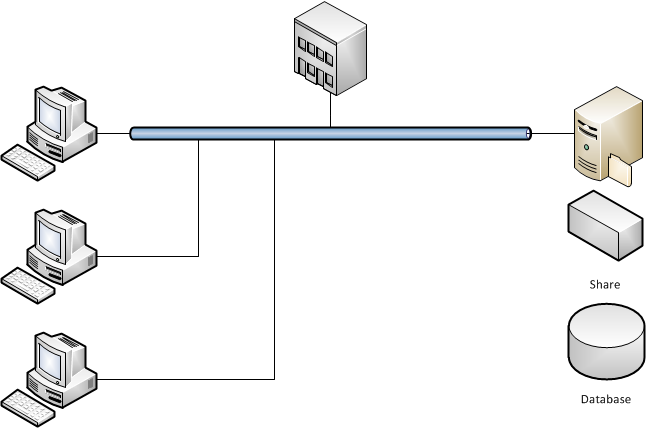AuditWizard - Installation Types - Multiple User
From Layton Support
(Difference between revisions)
m (Added "Back to Contents" link) |
m (Tweaked Installation link) |
||
| Line 1: | Line 1: | ||
| + | <p align="right">[[File:btn_back_up.png|link=User Guide for AuditWizard]] [[User Guide for AuditWizard|<u>Back to Contents</u>]]</p> | ||
In this configuration, each workstation has the application installed on it. They all use a common database, hosted on a SQL Server. | In this configuration, each workstation has the application installed on it. They all use a common database, hosted on a SQL Server. | ||
| Line 4: | Line 5: | ||
Figure: Multiple-User Network Configuration</p> | Figure: Multiple-User Network Configuration</p> | ||
| − | Install the application on each computer as per [[Installation]]. Each will have an embedded database. On launch, run the [[AuditWizard-Change Database Wizard|Change Database Wizard]] to change the connection to the database on your SQL Server. | + | Install the application on each computer as per [[AuditWizard™ - Installation|Installation]]. Each will have an embedded database. On launch, run the [[AuditWizard-Change Database Wizard|Change Database Wizard]] to change the connection to the database on your SQL Server. |
Pros: | Pros: | ||
Revision as of 01:12, 6 October 2010
In this configuration, each workstation has the application installed on it. They all use a common database, hosted on a SQL Server.

Figure: Multiple-User Network Configuration
Install the application on each computer as per Installation. Each will have an embedded database. On launch, run the Change Database Wizard to change the connection to the database on your SQL Server.
Pros:
- Multiple instances of the application can use the same data
- If a full SQL Server is in use, not an Express version, the database can be automatically backed up using SQL Server's backup feature.
- Users can use the application on their own workstation rather than logging into the server to run it.
Cons:
- Application must be updated on all workstations each time.